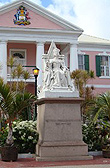| Source: Date: Updated: |
TheBahamasInvestor.com
Thursday, March 7, 2019 Sunday, March 10, 2019 |
Deputy Prime Minister and Minister of Finance Peter Turnquest said investment funds form a critical component of The Bahamas’ financial services toolkit and the legislation governing them needs to be updated.
“As of 31st December 2018, there were 749 licensed investment funds and 62 licensed investment fund administrators in the jurisdiction,” DPM Turnquest explained in his address on the Investment Funds Bill, 2019 in the House of Assembly, March 8, 2019.
He tabled the Bill in the House February 29, 2019, and it proposes to modernise the vital investment funds industry in The Bahamas by introducing an overhauled legal and regulatory framework that is compliant with international standards and best practices, and is replete with improved provisions to protect investors and lay the foundation to attract new and increased business to The Bahamas.
The DPM said the investment funds industry has been exemplary of Bahamian innovation in financial services, giving birth to the world-leading Specific Mandate Alternative Regulatory Test (SMART) Fund product in 2003 and more recently, the Investment Condominium, a ground-breaking, bespoke legal structure for Bahamian investment funds.
“Despite the industry being a centre for Bahamian financial services innovation however, the legislation and regulations governing the sector have become outdated, and now pose a risk to the reputation of the jurisdiction as a world-leading international financial centre.”
DPM Turnquest presented the major changes the Bill will introduce.
He noted that among the more fundamental of the changes the Bill proposes, is to rewrite what an investment fund is for the purpose of licensing and regulation, and what it means to carry on investment fund business in or from The Bahamas.
“The result is that the conditions that would require or trigger a fund or its various operators, managers, related parties, etc, to be licensed, have been changed in the proposed legislation.”
DPM Turnquest said the definition of an investment fund in the new Bill is a “unit trust, company, partnership or investment condominium that issues or has equity interest, the purpose or effect of which, is the pooling of investor funds with the aim of spreading investment risks and achieving profits or gains from the acquisition, holding, management or disposal of investments.”
He said unlike the previous definition, there is no other requirement for a connection or “nexus” to The Bahamas built into it.
Under the provisions of the Bill, licensing as an investment fund is triggered by an entity that fits the definition of an investment fund carrying on, or attempting to carry on business in or from The Bahamas.
DPM Turnquest noted that regarding what it means for an investment fund to be carrying on business in or from The Bahamas, the definition has been expressly included in the proposed Bill and now applies to an investment fund that is incorporated in The Bahamas, or offered for sale to non-accredited investors in The Bahamas.
He explained that non-accredited investors refers to individual investors, rather than institutions such as banks and insurance companies, who do not meet specified wealth criteria, such as having a net worth in excess of $1 million, or making an individual income of $200,000 annually, for example.
“This provision ensures that the triggers for licensing and regulation are oriented to the protection of those most vulnerable, and needing perhaps the greatest protection from a regulatory perspective – ordinary persons for whom an investment gone wrong as a result of misconduct or other infractions of securities laws will have the greatest financial impact.”
DPM Turnquest said: “Also of note, these new definitions mean that investment funds are eligible for licensing based on the activity they conduct or intend to conduct and who will be impacted by those activities, and not on whether or not certain service providers to the fund are located or licensed in The Bahamas.”











